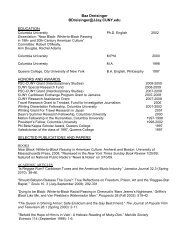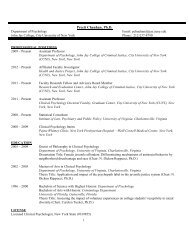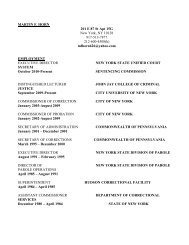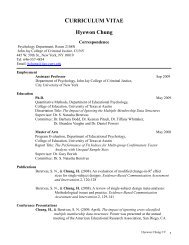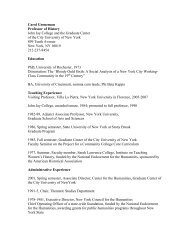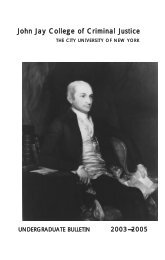Bulletin - John Jay College Of Criminal Justice - CUNY
Bulletin - John Jay College Of Criminal Justice - CUNY
Bulletin - John Jay College Of Criminal Justice - CUNY
You also want an ePaper? Increase the reach of your titles
YUMPU automatically turns print PDFs into web optimized ePapers that Google loves.
Courses <strong>Of</strong>fered<br />
PHI 322 Judicial and Correctional Ethics<br />
(Same course as CRJ 322)<br />
3 hours, 3 credits<br />
A treatment of some of the central issues of judicial and correctional<br />
ethics. Traditional ethical theories will be applied to such topics as<br />
plea bargaining, bail and preventive detention, wiretapping,<br />
enforcement of sexual morality, sentencing, punishment, prisoners’<br />
rights and parole.<br />
Prerequisites: ENG 102 or ENG 201, and PHI 231 or permission of<br />
the section instructor<br />
PHI 326 Topics in the History of Modern Thought<br />
3 hours, 3 credits<br />
This course will explore in depth one of the basic philosophic<br />
movements or conceptual themes that characterize modernity such as<br />
individualism, natural rights, freedom\liberty, utilitarianism, the<br />
Enlightenment, secularization, or existentialism. The course will<br />
analyze the metaphysical as well as the political presuppositions of<br />
the selected theme in relation to its historical context. (The course<br />
instructor will choose the semester's theme.)<br />
Prerequisites: ENG 102 or ENG 201, and PHI 231 or permission of<br />
the instructor<br />
PHI 327 19 th -Century European and American<br />
Philosophy<br />
3 hours, 3 credits<br />
This course looks at major trends in 19 th -century European and<br />
American philosophy, a century that created the basic texts and<br />
traditions for movements such as Positivism, Pragmatism,<br />
Existentialism, Transcendentalism and Marxism, as well as carrying<br />
through on the 18 th -century currents of Idealism. Historical texts may<br />
include the writings of Hegel, Marx, Kierkegaard, Nietzsche, Comte,<br />
Frege, Peirce, Bentham, Mill, Emerson and Thoreau. The course will<br />
look at the texts in their own right, as well as seeing how they came<br />
out of the philosophical thought of the previous century, and, most<br />
importantly, how they informed the political, social and ethical<br />
positions of the current age.<br />
Prerequisites: ENG 102 or 201; PHI 231 or permission of the<br />
instructor<br />
PHI 333 Theories of Gender and Sexuality<br />
(Same course as GEN 333)<br />
3 hours, 3 credits<br />
Gender Studies is a field that has been formed in and through theories<br />
originating in women’s studies, queer theory, masculinity studies and<br />
their intersections with race and class. In this course students will<br />
learn how gender studies theories have re-conceptualized gender and<br />
sexuality as products of the interactions among historical,<br />
representational, racial and cultural constructs. Readings and<br />
discussions will focus on a series of themes and issues such as rage,<br />
bodies, gender performance, family, consumerism, and political<br />
rights.<br />
Prerequisites: ENG 102 or 201; and GEN 205 or PHI 231<br />
PHI 340 Utopian Thought<br />
3 hours, 3 credits<br />
Representations of ideal societies have played an important part in<br />
discussions of justice since Plato’s Republic, This course will focus<br />
on some of the classical utopian (and dystopian) texts as well as on<br />
representative contemporary literary efforts in the utopian tradition.<br />
We will also examine some of the philosophical, literary, and<br />
historiographical analyses of utopian thought and of the social<br />
phenomena associated with it.<br />
Prerequisites: ENG 102 or ENG 201, and PHI 231 or permission of<br />
the instructor<br />
128



